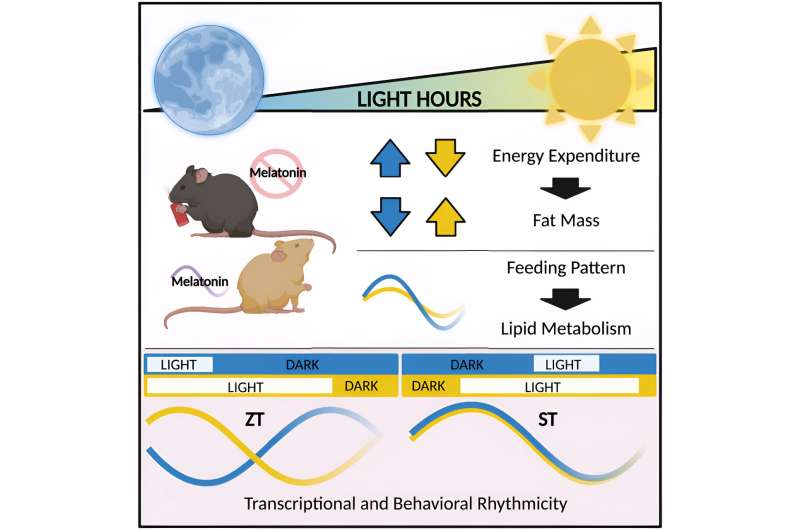This article has been reviewed according to Science X's editorial process and policies. Editors have highlighted the following attributes while ensuring the content's credibility:
fact-checked
peer-reviewed publication
trusted source
proofread
Study finds link between seasons and eating habits

The number of hours of light exposure we experience affects how we eat and how we burn energy. This may help us understand the link between seasons and metabolism.
You might imagine that you're healthier in the summer. The sun is shining, we get plenty of vitamin D, and the days are long.
However, recent research from the University of Copenhagen suggests that eating habits in winter may be better for our metabolic health than eating habits in summer, at least if you're a mouse. Researchers have examined the metabolism and weight of mice exposed to both "winter light" and "summer light."
"We found that even in non-seasonal animals, differences in light hours between summer and winter do cause differences in energy metabolism. In this case, body weight, fat mass and liver fat content," says Lewin Small, who carried out the research while a postdoc at Novo Nordisk Foundation Center for Basic Metabolic Research at the University of Copenhagen.
He adds, "We found this mostly in mice exposed to winter light hours. These mice had less body weight gain and adiposity. They have more rhythmicity in the way they eat over a 24-hour period. And this then led to benefits in metabolic health."
The study is the first of its kind to examine light hour's influence on metabolism in mice, that are not considered seasonal animals as like humans they do not only breed in specific seasons. Animals breeding in specific seasons gain weight before the breeding season to save energy supplies.
The article "Seasonal light hours modulate peripheral clocks and energy metabolism in mice" is now published in Cell Metabolism.
Light hours affect the metabolism
The researcher's inspiration for initiating the study stemmed from the significant variation in daylight hours across various regions of the world.
"We study the influence of the time-of-day on aspects of metabolism such as exercise, obesity and diabetes. However, most studies that investigate this link do so assuming an equal length of day and night all year round," says Small.
Therefore, they wanted to find out what the seasonal light differences meant for the metabolism. Most people in the world live with at least a two-hour difference in light between summer and winter.
"I come from Australia, and when I first moved to Denmark, I was not used to the huge difference in light between summer and winter and I was interested in how this might affect both circadian rhythms and metabolism," says Small. "Therefore, we exposed laboratory mice to different light hours representing different seasons and measured markers of metabolic health and the circadian rhythms of these animals."
Because the research was conducted using mice as the experimental subjects, it is not possible to assume that the same thing goes for humans.
"This is a proof of principle. Do differences in light hours affect energy metabolism? Yes, it does. Further studies in humans may find that altering our exposure to artificial light at night or natural light exposure over the year could be used to improve our metabolic health," says Juleen Zierath, Professor at the Novo Nordisk Center for Basic Metabolism Research (CBMR) and senior author of the study.
Small adds that the new knowledge is important to understand how eating patterns are affected by the light and seasons which might help us understand why some people gain more weight or if people gain more weight in a specific time of year.
"Differences in light between summer and winter could affect our hunger pathways and when we get hungry during the day," he says.
More information: Lewin Small et al, Seasonal light hours modulate peripheral clocks and energy metabolism in mice, Cell Metabolism (2023). DOI: 10.1016/j.cmet.2023.08.005





















